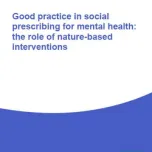The report 'Good practice in social prescribing for mental health: The role of nature-based interventions', published today on gov.uk, sets out the benefits of social prescribing for mental health, wellbeing and the NHS budget.
Social prescribing is the mechanism which provides GPs with non-medical referral options, such as nature-based interventions alongside existing treatments to improve health and wellbeing - potentially at much less cost to the NHS. Simon Stevens, CEO of the NHS, identified social prescribing in his Five Year Forward View of NHS England, as one key way in which the NHS can change from “a ‘factory’ model of care and repair” to one that focuses on much wider individual and community engagement.
In order to understand more about social prescribing and how effectively it is working in the natural environment sector, Natural England commissioned Mind, the UK’s leading mental health charity and researchers at Care Farming UK, to undertake a comprehensive review of current practice.
The benefits from social prescribing identified in the study include:
- Better outcomes for health and social care.
- Improvements in mental health and wellbeing of patients.
- Cost-effective use of NHS resources.
- More effective use of GP time.
The report concludes that a 'successful' social prescribing service depends on good partnerships. The key challenges and barriers to engaging GPs with social prescribing include:
- The need for a more consistent or standardised referral mechanism for social prescription services.
- The need for a funding mechanism that enables service provision to both grow and be sustainable.
- To develop quality assurance requirements for service-providers, so GPs have greater confidence in the quality of the services.
- To work with GPs, and health and social care commissioners, to improve their awareness of the nature-based interventions being offered in their local area and the health benefits these could bring.
Following on from the conference 'Transforming Mental Health and Dementia Provision with the Natural Environment', which was co-hosted by Natural England and CSH, Natural England has been working closely with colleagues in the NHS, Department of Health and the King’s Fund to agree how we can maximise the contribution of the environment sector to social prescribing .
Anu Singh, Director of Patient and Public Voice and Insight at the NHS said, "We welcome this report from Natural England, which makes helpful recommendations about spreading social prescribing across the country. We look forward to working with all partners (both national and local) to develop social prescribing, which makes an important contribution to reducing loneliness, managing long-term conditions and mental health problems. The environmental sector provides many creative, therapeutic opportunities to connect people with local communities and the natural world."
To read the report please click here.

Please log in or sign up to comment.